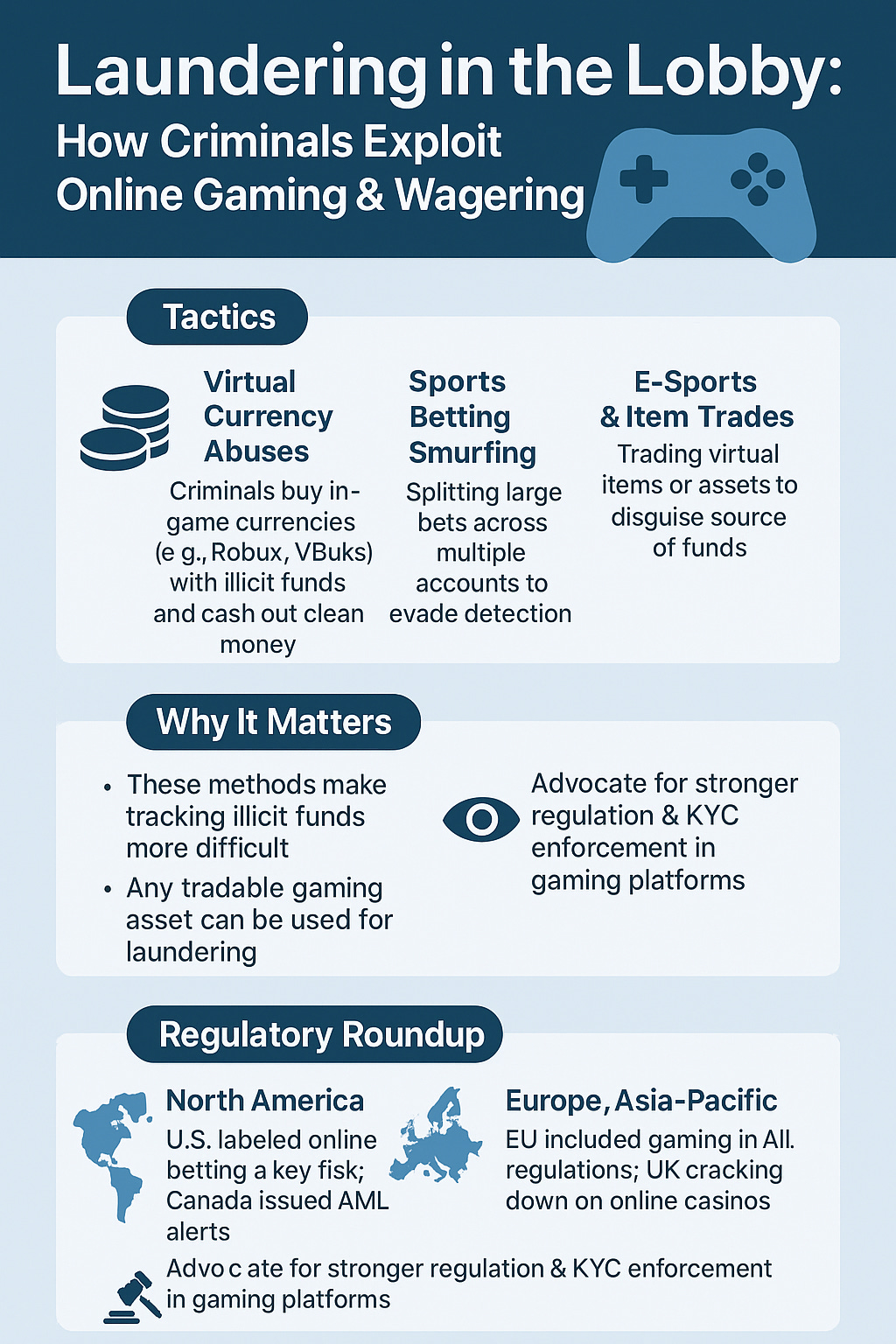Issue #13 - How Criminals Exploit Online Gaming & Wagering
Polar Insider | Issue #13 | Week of 26 May 2025
🧊 Introduction
Hi there,
Welcome to this week’s edition. This week, we’re exploring how online gaming and betting are becoming hotspots for money laundering and what can be done to combat these growing risks. From in-game currency abuses to regulatory action, here’s what you need to know.
Here’s what you’ll find inside this issue:
📌 Top Story – How Criminals Exploit Online Gaming & Wagering
🌍 Regulatory Roundup – Global AML actions targeting gaming and betting platforms
🔎 Case Study – Roblox’s Virtual Loot: In-Game Currency Laundering Unveiled
🧰 Compliance Toolkit – Guidance, red flags, and resources for gaming AML
📌 Top Story
How Criminals Exploit Online Gaming & Wagering
Online gaming and betting platforms are booming, drawing in millions of users and billions of dollars. But the same features that make them fun and accessible also make them ripe for exploitation by criminals. High anonymity, global reach, and weak oversight create opportunities for laundering dirty money.
How It’s Done:
What You Can Do:
Look for unusual account activity, like repeated trades between the same individuals or big deposits followed by immediate withdrawals.
Help close regulatory gaps by insisting on better KYC standards in gaming platforms.
🌍 Regulatory Roundup
Authorities worldwide are recognizing the risks in online gambling and gaming. Here's a snapshot of what’s happening:
North America:
The U.S. government flagged online mobile betting as a key risk for 2024. Some unlicensed sportsbooks operate as money transmitters without enough oversight.
Canada has uncovered offshore gambling sites funnelling funds into local accounts, urging banks to scrutinize e-transfers tied to betting.
Europe:
The EU included gaming and virtual currencies in its updated AML regulations.
The UK is stepping up enforcement, fining online casinos for allowing suspicious deposits and unchecked high-stakes losses.
Malta, a hub for gaming firms, has tightened oversight after FATF scrutiny exposed lax controls.
Asia-Pacific:
Vietnamese authorities dismantled a $1 billion illegal betting ring.
The Philippines is cracking down on offshore gaming operators tied to laundering activities.
Australia banned credit cards for online gambling, aiming to curb laundering risks.
Key Message:
The online gaming industry is now held to the same high standards as banks and traditional casinos. Non-compliance can lead to heavy fines and reputational damage.
🔎 Case Study
Roblox & Virtual Currency Abuse
A recent legal filing in California has revealed a money laundering operation within the virtual economy of Roblox. Criminals exploited the platform's virtual currency, Robux, to transfer illicit funds. Roblox identified and flagged 311 accounts involved in suspicious activities, where users repeatedly purchased fake in-game items from the same sellers. This process allowed bad actors to move stolen money through Roblox's digital ecosystem.
Tactics Used:
Fake Digital Items: Individuals created seller accounts offering items with no actual value, using Robux purchases to facilitate the transfer of funds.
Stolen Payment Methods: Illicit fiat currency was converted into Robux, then into fake goods, and back into clean Robux, which could be cashed out or sold.
Multiple Accounts and High-Value Trades: Suspicious users engaged in repetitive, high-value transactions, spending more than 80,000 Robux (approx. $1,000) per account to appear as legitimate players.
Outcome:
Roblox excluded the 311 flagged accounts from a broader $7.5 million settlement, citing their misconduct but refuting the characterization of these activities as money laundering. The exposure of this scheme prompted the company to reevaluate its transaction monitoring systems.
Key Takeaways for Compliance Teams:
Risks of Gaming Currencies: Virtual currencies such as Robux, V-Bucks, or other in-game assets can be leveraged for money laundering. Therefore, gaming platforms must treat these transactions with similar scrutiny applied to traditional e-money services.
Transaction Red Flags: High-frequency, high-value trades, unusual patterns of gift card purchases, and linked accounts cycling funds are indicators of potential money laundering in gaming environments.
Collaborative Monitoring: Financial institutions, such as banks and payment processors, should carefully assess gaming-related transactions for irregularities, while gaming companies enhance the detection of suspicious activities on their platforms.
This case highlights how even platforms targeting younger audiences can fall prey to exploitation, underscoring the importance of robust financial crime controls in managing virtual economies effectively.
🧰 Compliance Toolkit
Equip yourself with these resources to tackle financial crime in gaming and betting effectively:
FATF Guidance on Casino AML Programs: Helpful for understanding risk-based approaches.
📎 Link → Read Guidance (FATF, 2008)
FINTRAC’s 2024 Online Gambling Typology Bulletin: Includes red flags like excessive use of prepaid cards and crypto mixers.
📎 Link → Read the Bulletin (FINTRAC, Jan 2024)
UK Gambling Commission Guidelines: Covers customer verification, risk assessments, and more.
📎 Link → UKGC Guidance and Policies
Use these guides to enhance your team’s ability to detect and mitigate risks.
💬 Quote of the Week
"Gambling operators must understand they are on the front line in the battle against money laundering — complacency is not an option."
— Andrew Rhodes, Chief Executive, UK Gambling Commission
🎁 Bonus for Subscribers
Don’t forget to download your copy of the 2025 Financial Crime Regulatory Tracker (USA, UK, AU).
Stay on top of AML requirements and enforcement trends globally.
👉


